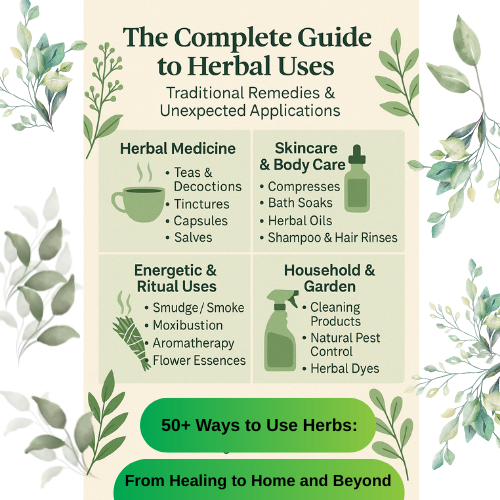How To Use Herbs In 50 Different Ways. Traditional Remedies and Surprising Everyday Uses.
Apr 22nd 2025
Herbs Are More Than Medicine
Herbs have been used for thousands of years to heal, nourish, and enrich daily life. But if you think herbs are only for teas and tinctures, think again. These powerful plants are far more versatile than most realize. Whether you're a holistic healer, DIY crafter, gardener, or natural living enthusiast, herbs are your untapped toolkit for wellness, creativity, household care, and so much more.
In this complete guide, we explore over 50 powerful ways to use herbs—from traditional remedies to unexpected, practical, and even magical applications. Learn how to integrate herbs into your food, skincare, home, garden, and spiritual life while building knowledge grounded in tradition, modern science, and eco-conscious living.
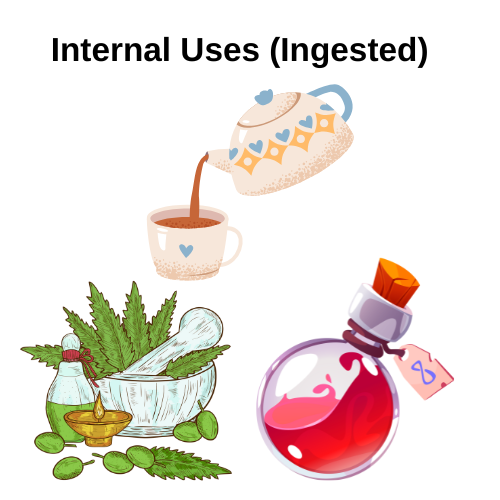 Internal Uses (Ingested)
Internal Uses (Ingested)
Exploring Internal Herbal Use: From Teas to Tinctures
Herbs are more than flavorful plants—they're versatile tools for nourishing the body from the inside out. Whether you're seeking gentle daily support or targeted therapeutic action, the way you prepare and consume herbs matters. Each method—infusion, decoction, tincture, and beyond—draws out different plant compounds and offers unique benefits. Understanding these forms helps you choose the right preparation for your specific health goals, lifestyle, and sensitivity.
Let’s explore the many safe and effective ways to take herbs internally.
| Form | Purpose & Use |
|---|---|
| Tea / Infusion | Steeping soft parts (leaves, flowers) for gentle daily support |
| Decoction | Simmering roots, bark, or seeds to extract minerals and stronger constituents |
| Tincture | Alcohol-based extraction for concentrated, fast-absorbing remedy |
| Glycerite | Alcohol-free alternative ideal for kids or alcohol-sensitive individuals |
| Herbal Syrup | Sweetened decoction often used for coughs and immune support |
| Capsules / Teapills | Ground herbs in pill form for easy dosing |
| Herbal Powder | Can be added to food, smoothies, or capsules for internal support |
| Elixir | Tincture blended with honey or syrup for flavor and shelf stability |
| Electuary | Herbal powders mixed with honey or nut butters to eat as a paste |
| Oxymel | Apple cider vinegar + honey + herbs for digestion and immune health |
| Herbal Vinegar | Infused vinegar used as a tonic or salad dressing |
| Digestive Bitters | Alcohol-based bitters taken before meals to aid digestion |
| Herbal Wine or Mead | Traditionally fermented beverages with infused herbs |
| Herbal Broths / Stocks | Simmering tonic herbs with bones or vegetables for nourishment |
| Herbal Edibles | Incorporated into snacks, baked goods, or energy balls |
| Smoothie Add-ins | Powders or extracts mixed into morning smoothies |
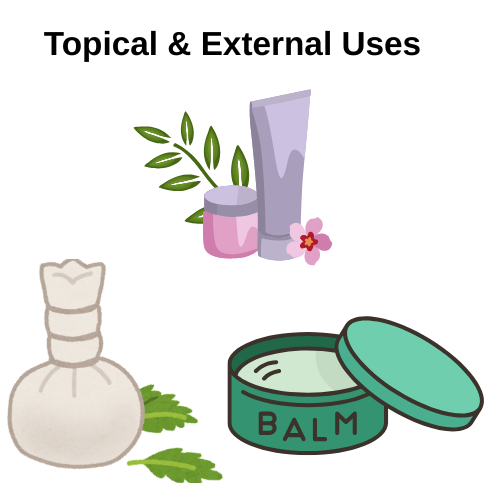 Topical & External Uses
Topical & External Uses
Herbal Healing from the Outside In: Topical & Bath Applications
Herbs don’t just support wellness internally—they’re powerful allies for external healing, skincare, and body care. When applied to the skin or used in baths, herbs can soothe inflammation, nourish tissues, ease tension, and restore balance. From infused oils and salves to steams and footbaths, these traditional preparations offer natural, time-tested ways to care for the body with gentle effectiveness and holistic intention.
| Form | Purpose & Use |
| Compress / Poultice | Applied to skin for pain, swelling, or infection |
| Herbal Oil Infusion | Used for massage, salve-making, or moisturizing skin |
| Salve / Balm | Healing ointment for wounds, burns, and dryness |
| Liniment | Liquid extract for sore muscles and bruising |
| Footbath / Hand Soak | Eases fatigue, swelling, or minor infection |
| Bath Soak / Sitz Bath | Full body relaxation or targeted perineal healing |
| Steam Inhalation | Clears sinuses and supports respiratory health |
| Facial Toner / Mist | Herbal water sprayed to tone and refresh skin |
| Herbal Shampoo / Rinse | For hair growth, scalp health, or shine enhancement |
| Tooth Powder / Mouthwash | Herbal blends to support oral health |
| Soaps & Body Products | Infused with herbs for fragrance and therapeutic value |
| Herbal Deodorants | Plant-based alternatives to chemical deodorants |
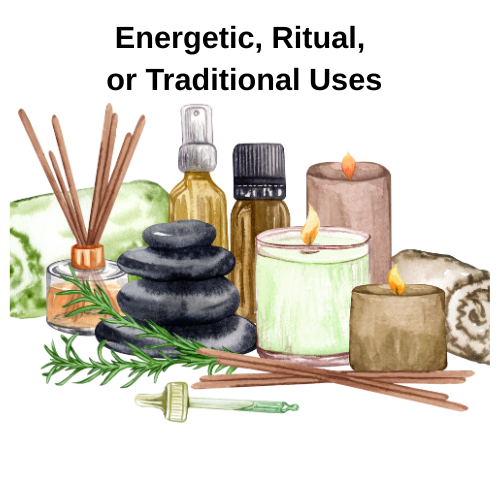 Energetic, Ritual & Traditional Uses
Energetic, Ritual & Traditional Uses
Herbs in Energetic, Ritual, and Traditional Practice
Beyond the physical, herbs have long played a vital role in emotional, spiritual, and energetic healing across cultures. Used in rituals, ceremonies, and daily energetic hygiene, herbs help clear stagnant energy, invite intention, and support inner transformation. Whether burned as smudge, infused into spiritual baths, or carried as talismans, herbs connect us to ancestral wisdom and the unseen layers of wellness. This section explores how plants can support more than the body—they can uplift the spirit and guide the soul.
| Use | Application |
| Moxibustion (Moxa) | Burning mugwort over acupuncture points to move Qi |
| Smudge / Smoke Bundles | Sage, mugwort, or cedar used to energetically cleanse space |
| Flower Essences | Vibrational therapy for emotional/spiritual alignment |
| Aromatherapy / Incense | Mood-enhancing, calming, or focusing scents |
| Spiritual Baths / Floor Washes | Ceremonial uses for cleansing and intention setting |
| Charm Bags / Talismans | Herbs carried or placed for symbolic and energetic purposes |
Household, Garden, & Practical Uses
Herbal Power for the Home, Garden, and Everyday Living
Herbs aren’t just for medicine cabinets and teacups—they're incredibly versatile tools for natural living. In the home, garden, and DIY space, herbs offer practical solutions that are sustainable, safe, and effective. From natural pest control and compost boosters to homemade cleaners and air fresheners, herbs can replace synthetic products while enriching your space with fragrance, function, and beauty. Whether you're nurturing plants, refreshing your home, or crafting your own products, these applications show how herbs support everyday life in powerful, unexpected ways.
| Use | Application |
| Herbal Cleaning Products | Infused cleaners for eco-friendly home hygiene |
| Natural Pest Control | Mint, neem, and lavender deter common insects |
| Herbal Dyes / Colorants | Natural pigments for fabrics, paper, or eggs |
| Plant Fertilizer (Green Manure) | Comfrey and nettle used to enrich garden soil |
| Compost Boosters | Herbs to speed composting and enrich microbial life |
| Aromatic Sachets | Drawer and closet fresheners with dried herbs |
| Potpourri & Air Fresheners | For room fragrance and mood enhancement |
| Herbal Candles | Added for meaning, scent, or seasonal intention |
| Insect Repellent Spray | Herbal sprays with citronella, catnip, or eucalyptus |
| Culinary Seasonings | Culinary herbs like thyme, oregano, garlic, and turmeric |
| Herbal Cleaning Vinegars | Vinegar infusions for antibacterial surface spray |
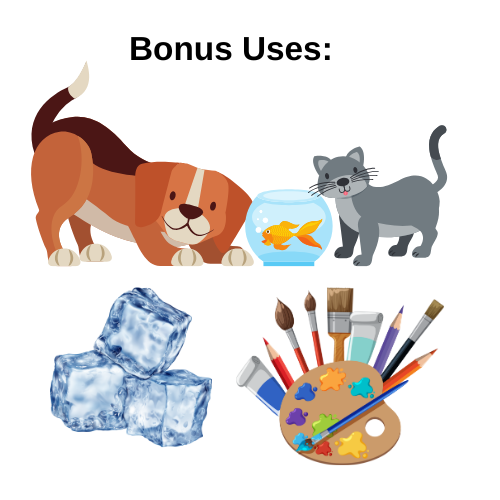 Bonus & Creative Uses
Bonus & Creative Uses
Some of the most fun and unexpected herbal uses fall outside the usual categories.
| Use | Application |
| Herbal Inks or Paints | Botanical pigment for crafts and journaling |
| Craft Projects | Dried or pressed herbs for soap, resin art, or candles |
| Herbal Ice Cubes | Decorative and flavorful for drinks or spa water |
| Pet Care | Mild rinses or salves for dogs and animals (vet-guided) |
| Bug Bite Relief | Natural anti-inflammatory compresses and salves |
| Natural Fabric Fresheners | Laundry sachets and sprays with lavender or mint |
Conclusion: You Are the Herbalist
Herbs are living allies, waiting to be invited into your kitchen, bath, medicine cabinet, garden, and ritual. They soothe and stimulate, protect and purify, flavor and heal. In every form, they offer a deeper way to connect with the natural world and your own intuitive wisdom.
Whether you're making tea, crafting a salve, cleansing your home, or nourishing your garden, you are participating in the herbal lineage that stretches back through generations. You don’t need to be an expert to begin. You just need curiosity, reverence, and a few good leaves.
Nature has already written the instructions. Now you get to choose how to use them.


